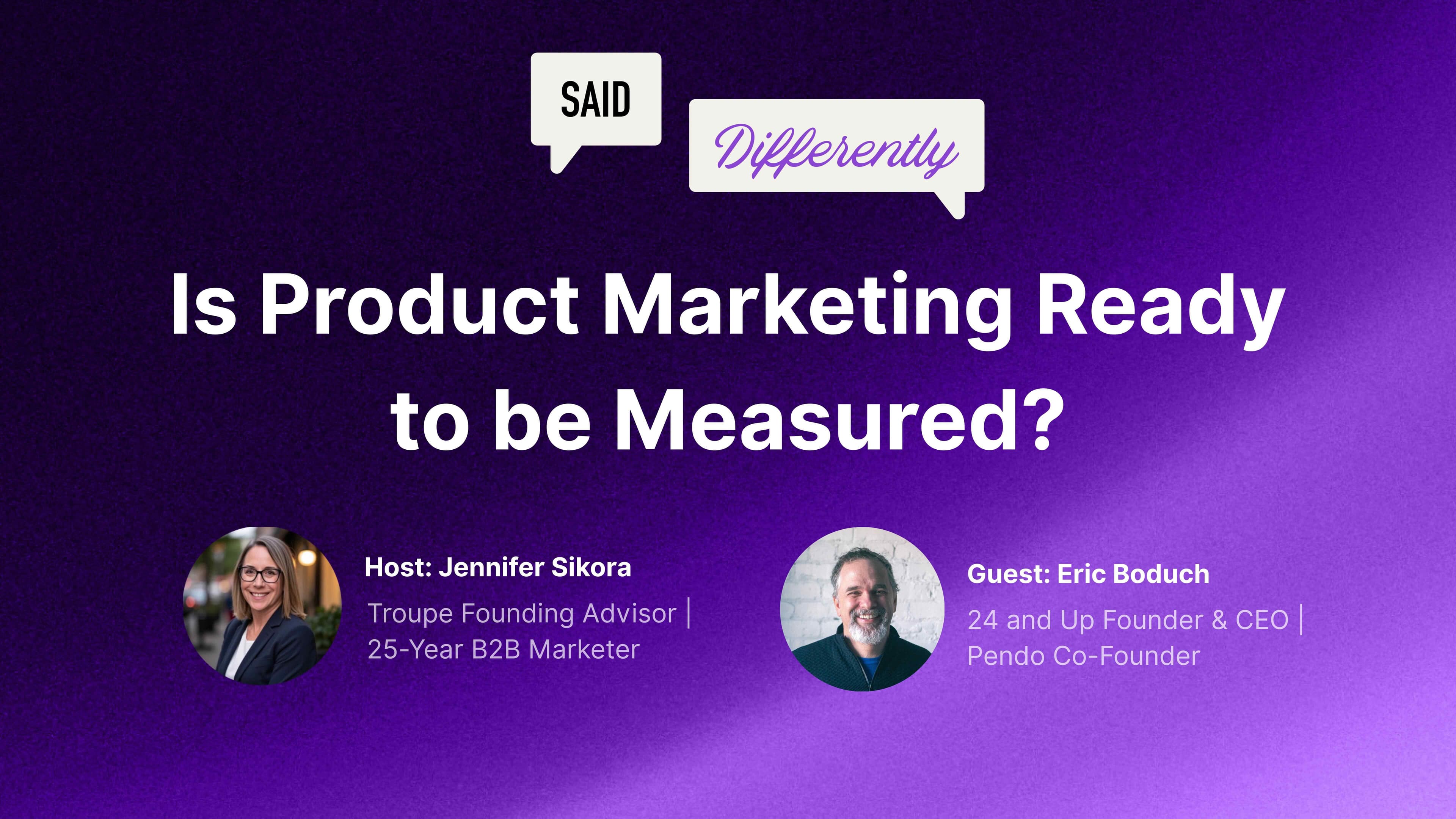

SAID DIFFERENTLY Ep.2: Is Product Marketing Ready to be Measured?
It has long been a challenge to determine exactly what metrics Product Marketing should "own." In this episode of Said Differently, Pendo co-founder and CEO/founder of the 24 and Up startup studio Eric Boduch shares his perspectives on how the measurement of Product Marketing is maturing -- and this means only good things for their path to CMO seats.
Appearing on Troupe's video Q&A program Said Differently, guest Eric Boduch — founder and CEO of the startup studio 24 and Up, and once-and-always co-founder and first head of marketing at Pendo — talked with host Jennifer Sikora to unpack a hot topic for B2B companies: how to measure the impact of product marketing.
“I would say it's always been difficult to measure the efficacy of a product marketing organization, because it's been difficult to figure out what metrics you want to hold them accountable for,” Boduch said. “And one might think [not being measured] isn’t a horrible thing for a product marketer, but it really is… because you [as a product marketer] want to stand out.”
The Measurement Gap in Product Marketing
For many marketing leaders, setting goals for product marketing has long been a challenge. Jennifer recalled her own experience as a CMO:
“It was always a challenge… There are sort of straightforward things, like competitive win rates, but then a lot of things ended up being what I call sort of deliverable-oriented goals… which weren’t really that meaningful.”
She cited things like number of analyst briefings and mentions; number of content pieces; product launch checklists. Boduch agreed, noting that while competitive win rates are commonly used, they’re often “an okay metric… in lieu of having nothing.” It also requires clean, trustworthy data — especially from CRM systems — to back up those measurements.

Win Rate as a North Star (With a Very Suitable U.S. Football Analogy)
Despite the complexity, Boduch is bullish on tying product marketing to win rate.
“I might argue that, why not just measure them against win rate? … I would argue really strong messaging, really strong brand story, really strong sales enablement… is a huge impact on that.”
He encouraged teams to look at trends over absolutes: “Maybe it’s not about necessarily tracking the absolute number, but the trending of the number… okay, how does that impact our win rate overall?”
To make the point, Boduch used a vivid U.S. football metaphor, where you look at messaging at all the different stages and think of it as opportunities to move the ball forward during each down of possession, and make progress toward an ultimate scoring outcome:
“I think of messaging a little bit as play calling. You still need the team to execute… but if the play calling is right, you’re more likely to execute, you’re more likely to get those conversions… and a win and closed deal is a touchdown.”
Jennifer connected this to Troupe’s mission to look at the progression of conversions and that it doesn't fall to just one player: “This is a team effort… to move things along in terms of the story, but also in terms of the end goal.”
That means looking at conversion rates between stages, spotting drop-offs, and ensuring sales has the right plays to move deals forward. As Boduch put it: “Your salespeople should know what to do, what to say at every stage of the cycle… to move that football down the field.”
Embracing Measurement Transparency, Even When It’s Uncomfortable
Some marketers may worry that more measurement will expose weaknesses. Boduch challenged that mindset:
“Good marketing teams should want that visibility and that transparency… because that visibility and transparency is what gives the C-team and the board confidence in them.”
It’s not about perfection: “A business isn’t just about doing everything perfect. It’s about understanding what’s not working perfect, and fixing those things.”
Metrics That Matter for Product Marketers
When pressed to get specific, Boduch shared a clear framework:
“I love win rate… I love conversions on the different steps of the cycle… I want [product marketers] to improve things… and I’d like to know… we’re winning more often than we’re losing against our competition.”
He added that in an ideal scenario, you can build high confidence if you ahve data showing that sales reps who stick to the messaging outperform those who go rogue: “That makes me think the messaging is solid… because the people that are doing it right are closing more deals.”
And the business impact is massive, even with small positive nudges earlier in the funnel:
“If your landing page with the updated messaging is now getting 20% of the people to sign up for demos versus 10… a program that was selling 5 million now is selling 10 million… just huge increases.”
Why Accountability Elevates Careers
Boduch closed with a challenge for product marketers who aspire to a C-level role:
“Having stronger metrics and stronger software systems and stack behind product marketing is going to enable them to jump into that C-suite more often at a quicker pace.”
Jennifer summed it up: “Said differently, product marketers should fear not about being held accountable to more metrics. They should invite it and welcome it.”